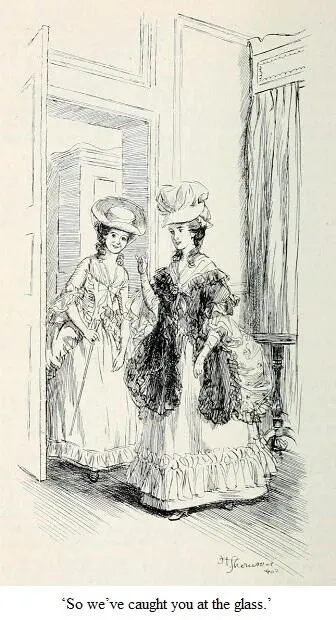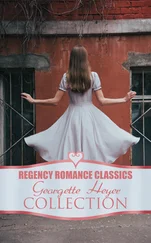“Indeed, Sir,” cried I, very much provoked, “I think — that is, I do not think any thing about her.”
“Well, really, Ma’am, you prodigiously surprise me! — mais, apparemment ce n’est qu’une facon de parler? — though I should beg your pardon, for probably you do not understand French?”
I made no answer, for I thought his rudeness intolerable; but Sir Clement, with great warmth, said, “I am surprised that you can suppose such an object as Miss Prue would engage the attention of Miss Anville even for a moment.”
“O, Sir,” returned this fop, “’tis the first character in the piece! — so well drawn! — so much the thing! — such true country breeding — such rural ignorance! ha, ha, ha! —’tis most admirably hit off, ‘pon honour!”
I could almost have cried, that such impertinence should be leveled at me; and yet, chagrined as I was, I could never behold Lord Orville and this man at the same time, and feel any regret for the cause I had given of displeasure.
“The only female in the play,” said Lord Orville, “worthy of being mentioned to these ladies is Angelica.”
“Angelica,” cried Sir Clement, “is a noble girl; she tries her lover severely, but she rewards him generously.”
“Yet, in a trial so long,” said Mrs. Mirvan, “there seems rather too much consciousness of her power.”
“Since my opinion has the sanction of Mrs. Mirvan,” added Lord Orville, “I will venture to say, that Angelica bestows her hand rather with the air of a benefactress, than with the tenderness of a mistress. Generosity without delicacy, like wit without judgment, generally gives as much pain as pleasure. The uncertainty in which she keeps Valentine, and her manner of trifling with his temper, give no very favourable idea of her own.”
“Well, my Lord,” said Mr. Lovel, “it must, however, be owned, that uncertainty is not the ton among our ladies at present; nay, indeed, I think they say — though faith,” taking a pinch of snuff, “I hope it is not true — but they say, that we now are most shy and backward.”
The curtain then drew up, and our conversation ceased. Mr. Lovel, finding we chose to attend to the players, left the box. How strange it is, Sir, that this man, not contented with the large share of foppery and nonsense which he has from nature, should think proper to affect yet more! for what he said of Tattle and of Miss Prue, convinced me that he really had listened to the play, though he was so ridiculous and foolish as to pretend ignorance.
But how malicious and impertinent is this creature to talk to me in such a manner! I am sure I hope I shall never see him again. I should have despised him heartily as a fop, had he never spoken to me at all; but now, that he thinks proper to resent his supposed ill-usage, I am really quite afraid of him.
The entertainment was, The Duece is in Him; which Lord Orville observed to be the most finished and elegant petit piece that was ever written in English.
In our way home, Mrs. Mirvan put me into some consternation by saying, it was evident, from the resentment which this Mr. Lovel harbours of my conduct, that he would think it a provocation sufficiently important for a duel, if his courage equaled his wrath.
I am terrified at the very idea. Good Heaven! that a man so weak and frivolous should be so revengeful! However, if bravery would have excited him to affront Lord Orville, how much reason have I to rejoice that cowardice makes him contended with venting his spleen upon me! But we shall leave town soon, and, I hope, see him no more.
It was some consolation to me to hear from Miss Mirvan, that, while he was speaking to me so cavalierly, Lord Orville regarded him with great indignation.
But, really, I think there ought to be a book of the laws and customs — a-la-mode, presented to all young people upon their first introduction into public company.
To-night we go to the opera, where I expect very great pleasure. We shall have the same party as at the play, for Lord Orville said he should be there, and would look for us.
LETTER 21
EVELINA IN CONTINUATION
Table of Contents
I have a volume to write of the adventures of yesterday. In the afternoon — at Berry Hill I should have said the evening, for it was almost six o’clock — while Miss Mirvan and I were dressing for the opera, and in high spirits from the expectation of great entertainment and pleasure, we heard a carriage stop at the door, and concluded that Sir Clement Willoughby, with his usual assiduity, was come to attend us to the Haymarket; but, in a few moments, what was our surprise to see our chamber door flung open, and the two Miss Branghtons enter the room! They advanced to me with great familiarity, saying, “How do you do, Cousin? — so we’ve caught you at the glass! — well, I’m determined I’ll tell my brother of that!”
Miss Mirvan, who had never before seen them, and could not at first imagine who they were, looked so much astonished, that I was ready to laugh myself, till the eldest said, “We’re come to take you to the opera, Miss; papa and my brother are below, and we are to call for your grand-mama as we go along.”
“I am very sorry,” answered I, “that you should have taken so much trouble, as I am engaged already.”
“Engaged! Lord, Miss, never mind that,” cried the youngest; “this young lady will make your excuses I dare say; it’s only doing as one would be done by, you know.”
“Indeed Ma’am,” said Miss Mirvan, “I shall myself be very sorry to be deprived of Miss Anville’s company this evening.”
“Well, Miss, that is not so very good-natured in you,” said Miss Branghton, “considering we only come to give our cousin pleasure; it’s no good to us; it’s all upon her account; for we came, I don’t know how much round about to take her up.”
“I am extremely obliged to you,” said I, “and very sorry you have lost so much time; but I cannot possibly help it, for I engaged myself without knowing you would call.”
“Lord, what signifies that?” said Miss Polly, “you’re no old maid, and so you needn’t be so very formal: besides I dare say those you are engaged to a’n’t half so near related to you as we are.”
“I must beg you not to press me any further, for I assure you it is not in my power to attend you.”
“Why, we came all out of the city on purpose: besides, your grand-mama expects you; — and, pray, what are we to say to her?”
“Tell her, if you please, that I am much concerned — but that I am pre-engaged.”
“And who to?” demanded the abrupt Miss Branghton.
“To Mrs. Mirvan — and a large party.”
“And, pray, what are you all going to do, that it would be such a mighty matter for you to come along with us?”
“We are all going to — to the opera.”
“O dear, if that be all, why can’t we go altogether?”
I was extremely disconcerted at this forward and ignorant behaviour, and yet their rudeness very much lessened my concern at refusing them. Indeed, their dress was such as would have rendered their scheme of accompanying our party impracticable, even if I had desired it; and this, as they did not themselves find it out, I was obliged, in terms the least mortifying I could think of, to tell them.

They were very much chagrined, and asked where I should sit.
“In the pit,” answered I.
“In the pit,” repeated Miss Branghton; “well, really, I must own, I should never have supposed that my gown was not good enough for the pit: but come, Polly, let’s go; if Miss does not think us fine enough for her, why to be sure she may choose.”
Читать дальше













